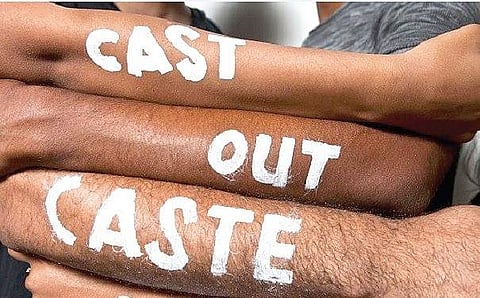

VILLUPURAM: As rural areas in Villupuram prepare to face local body elections, the question remains whether caste discrimination would continue to rear its ugly head or access to social media would make life easier for leaders belonging to the oppressed classes.
TNIE spoke to a few former panchayat presidents in the district about their experiences of caste oppression over the past decade and the scope of rural administration.
Dalit Panchayat President K Mangavarathal (49) of Yeppakkam in Olakkur is now contesting for the post of district ward member. In 2010, villagers expected her to resign after her husband died.
However, she became the next panchayat president between 2011 and 2016.
Mangavarathal said: “Whenever I tried to bring in new roads, villagers belonging to the dominant caste wrote to the officials claiming there was no need for the new road. So I had to write to multiple authorities for genuine demands for facilities.”
She added: “Being a Dalit and a woman meant double trouble for me. During campaigns, the opponents would assassinate my character. Some were even annoyed by seeing me using a table and chairs at the panchayat office.”
Managavarathal, however, hopes things will change for good after 10 years.
“The future of rural administration seems less troubling with parties like the VCK rising to power with four MLAs and two MPs, and the DMK-led government announcing prizes for anti-caste villages,” she added.
M Renganathan (70), a member of the Irula tribe, was the panchayat president of Rettipalayam village in Gingee taluk between 2011 and 2016. According to him,
“Every year during the Gram Sabha meeting on Republic day, the panchayat president would announce a list of beneficiaries of government schemes. I was forced to choose names selected by the village chairman belonging to the AIADMK.”
Renganathan highlighted the reasons for the social privileges enjoyed by local politicians.
“Our people work on their fields. So, if I asserted my power as the panchayat president, then the caste Hindus would deny work to our people. Socially and economically, we were unable to fight them and so I had to suffer in silence.”
Renganathan also alleged the female panchayat secretary used to give him Rs 200-300 daily and asked him to sign documents.
“I was never told what the documents were for. If I denied, I was threatened by the woman and her husband that my family members would be assaulted. I am not literate so I used my thumbprints,” claimed Renganathan.
However, now the evidence of discrimination can be easily brought to light with the help of technology, he said, adding, “Now a video or a photo can bring immediate change by inviting government action.”
N Senthil Kumar from Vazhudhavur village in Kandamangalam block said: “I was not as vulnerable as others, who did not have party support, as I belonged to the VCK. For the upcoming panchayat leaders, it is a golden period because of the easy access to global knowledge and the government through social media.”
‘Awareness of social justice has increased’
N Senthil Kumar from Vazhudhavur village in Kandamangalam block said awareness of social justice has increased and the future panchayat presidents might not suffer discrimination like their predecessor.